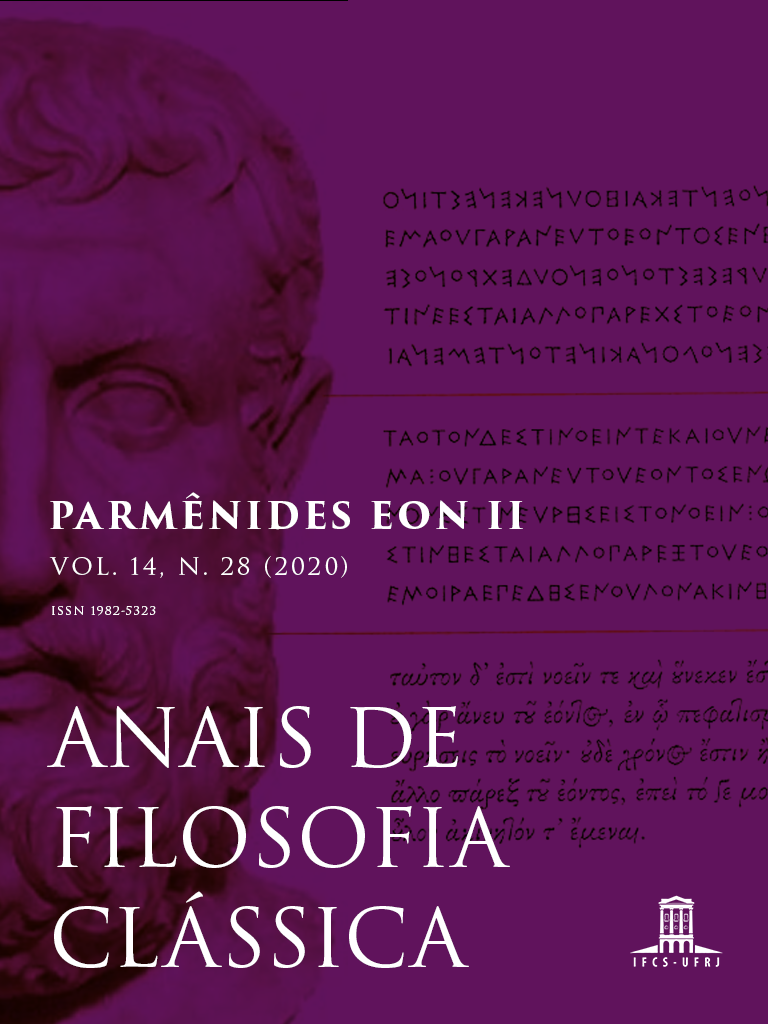Several New Notions Introduced and Exploited, but not Made Explicit, by Zeno (of Elea)
DOI:
https://doi.org/10.47661/afcl.v14i28.41369Palabras clave:
Zeno of Elea, Gorgias, Plato, Communication Strategies, Paradoxes, The Stadium Paradox, The Space ParadoxResumen
That Zeno availed himself of a number of previously unfamiliar (and often unknown) and very sophisticated notions, such as that of relative speed, a ten thousandth, infinite division and so on—almost a dozen mostly innovative notions—is a point one simply cannot deny. Yet, so far as I know, this feature of Zeno’s remains has never been highlighted and studied as they probably deserve with only one notable exception: a seminal paper by Cherubin-Mannucci 2011.Let me state first some facts. That the paradox of the Millet Seed exploits the notion of to murioston (“the/a ten thousandth”) is clearly assumed by our main source (Simplicius), an adjective noun that, while murios as a notion is already at use in the Homeric poems, is totally unattested before; it is therefore unlikely that it had some circulation before Zeno. Moreover, this notion plays a key role; in fact, this paradox, left without to murioston, would simply collapse. But consider the Dichtomy (‘division in two parts’) paradox: what would remain, were the notion of infinite division not clearly at work, thus not yet clearly available to Zeno? Or the Stadium: what would remain, were the notions of relative motion and that of onkoi (‘masses’) not yet clearly available at least to him? To devise a Stadium without being able to rely upon them would have been extremely difficult!
This is the starting point of the paper, which is meant to account as clearly as I can for so fantastic a repository of totally unknown notions. It follows than, in my opinion, no professional account of Zeno’s paradoxes is conceivable without focusing one’s attention upon what ostensibly was a total novelty, and a new beginning.
A notable feature of these pages is the attention paid to what Gorgias and Plato knew about the Space paradox (sources usually excluded from the main collections).Descargas
Citas
BERNABÉ, Alberto. Fragmentos presocráticos. Madrid: Abada, 2019.
CAVEING, Maurice. Zénon d’Elée: Prolégomènes aux doctrines du continu: étude historique et critique des fragments et témoignages. Histoire des Doctrines de l’antiquité classique 7. Paris: J. Vrin, 1982.
CHERUBIN, R.M. and M.A. MANNUCCI. “A very short History of Ultrafinitism”, in J. Kennedy – R. Kossak (eds.), Set Theory, Arithmetic, and Foundations of Mathematics: Theorems, Philosophies, Cambridge: Cambridge University Press, 2011, 180-199.
CORNFORD, F.M. Plato and Parmenides: Parmenides’ Way of Truth and Plato’s Parmenides. London: Routledge & Kegan Paul, 1939.
DIELS, H. and W. Kranz. Die Fragmente der Vorsokratiker. 6th ed., Berlin: Weidmann, 1952.
FANO, Vincenzo. I paradossi di Zenone. Roma: Carocci, 2012.
FERBER, Rafael. Zenons Paradoxie der Bewegung und die Struktur von Raum und Zeit. Zetemata 76. München: C.H. Beck, 1981.
GEMELLI MARCIANO, M.L. Die Vorsokratiker. Band II, Parmenides, Zenon, Empedokles: Griechisch-Lateinisch-Deutsch. Sammlung Tusculum. Düsseldorf: Artemis & Winkler, 2009.
GOULET, Richard. “Zénon d’Élée”, in R. Goulet (ed.), Dictionnaire des philosophes antiques, vol. VII, D’Ulpien à Zoticus. Paris: CNRS Éditions, 2018, 346-359.
GRAHAM, D.W. The Texts of Early Greek Philosophy: The Complete Fragments and Selected Testimonies of the Major Presocratics. Cambridge: Cambridge University Press, 2010.
KIRK, G.S. and J.E. Raven. The Presocratic Philosophers: A Critical History with a Selection of Texts. Cambridge: Cambridge University Press, 1957.
KIRK, G.S., J.E. Raven, and M. Schofield. The Presocratic Philosophers: A Critical History with a Selection of Texts. 2nd ed. Cambridge: Cambridge University Press, 1983.
LAKS, A. and G.W. Most. Early Greek Philosophy. 9 vols. Loeb Classical Library 524-532. Cambridge, MA: Harvard University Press, 2016.
______. Les débuts de la philosophie: des premiers penseurs grecs à Socrate. Paris: Fayard, 2016.
LEE, H.D.P. Zeno of Elea. A Text, with Translation and Notes. Cambridge: Cambridge University Press, 1936.
MANSFELD, Jaap. Die Vorsokratiker. 2 vols. Stuttgart: P. Reclam, 1983.
MANSFELD, Jaap, and Oliver Primavesi. Die Vorsokratiker. Stuttgart: Reclam, 2012.
MCKIRAHAN, R. D. Philosophy Before Socrates: An Introduction with Texts and Commentary. 2d ed. Indianapolis: Hackett Publishing Co., 2010.
RAPP, C. “Zenon”, in Flashar, H., D. Bremer, and G. Rechenauer, eds. Die Philosophie der Antike. Band 1, Frühgriechische Philosophie. Grundriss der Geschichte der Philosophie. Basel: Schwabe, 2013, 531-572.
ROSSETTI, L. “Sull’intreccio di logica e retorica in alcuni paradossi di Zenone di Elea”, Archiv für Geschichte der Philosophie 74, 1992, 1-25.
______. Strategie macro-retoriche. La 'formattazione' dell'evento comunicazionale, Palermo: Centro internazionale studi di estetica, 1994.
______. “Zenone di Elea, maestro in comunicazione”, in Cortés Gabaudan, F. and J.V. Méndez Dosuna (eds.), Dic mihi musa virum. Homenaje al Profesor Antonio López Eire, Salamanca, Universidad de Salamanca, 2010, 595-602.
______. “La empresa de Zenón, monumento a la creatividad”, Hypnos (São Paulo) 39, 2017, 160-178.
______. Parmenide e Zenone sophoi a Elea, Pistoia: Petite Plaisance, 2020.
______. Verso la filosofia. Nuove prospettive su Parmenide, Zenone e Melisso, Baden Baden: Academia Verlag, 2020.


